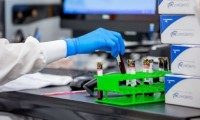-
Galera Lays Off 70% of Staff After FDA Rejection in Severe Oral Mucositis
- Source: drugdu
- 118
- August 14, 2023
-
Illumina Lowers Outlook as Business Challenges, Exec Departures Continue
- Source: drugdu
- 110
- August 12, 2023
-
A promising new treatment for hematological malignancies
- Source: drugdu
- 112
- August 11, 2023
-
BioNTech and Duality Biologics add third ADC candidate to oncology partnership
- Source: drugdu
- 103
- August 11, 2023
-
Guardant, Illumina agree to end litigation, extend commercial partnership
- Source: drugdu
- 177
- August 10, 2023
-
Dendritic cells found to kill CD47-deficient T cells
- Source: drugdu
- 113
- August 10, 2023
-
MSD and Astex announce expansion to oncology drug discovery collaboration
- Source: drugdu
- 113
- August 10, 2023
-
As COVID revenues disappoint, once-high-flying Pfizer looks at possible cost cuts
- Source: drugdu
- 166
- August 3, 2023
-
UKHSA data reveals a 45% decline in hepatitis C prevalence in England
- Source: drugdu
- 126
- August 1, 2023
-
FDA Adopts New Sterilization Standard to Support Switch From Ethylene Oxide
- Source: drugdu
- 144
- July 28, 2023
your submission has already been received.
OK
Subscribe
Please enter a valid Email address!
Submit
The most relevant industry news & insight will be sent to you every two weeks.













